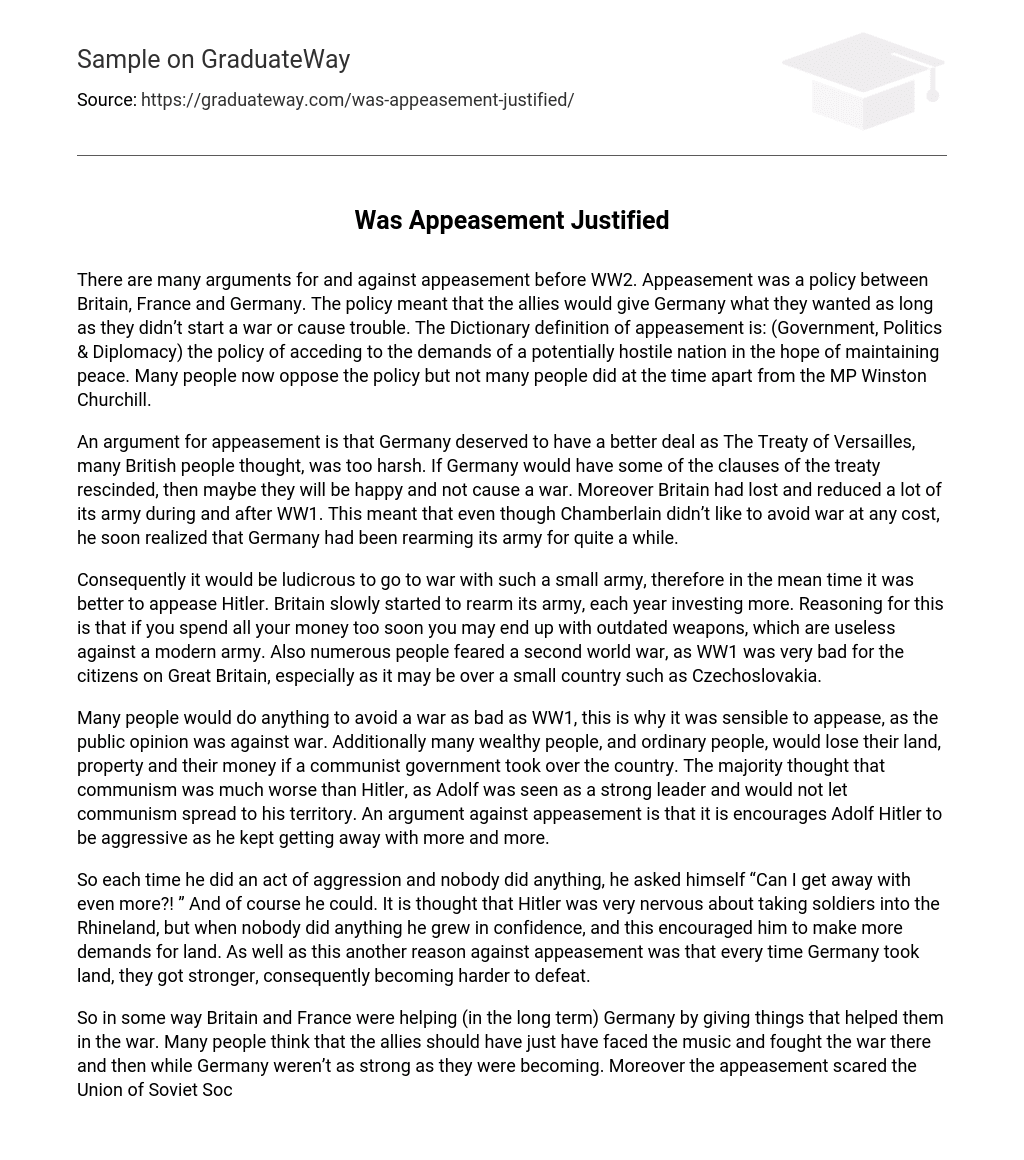Before World War 2, there were varied opinions on the policy of appeasement involving Britain, France, and Germany. The allies agreed to fulfill Germany’s requests while avoiding war or disruptions. According to the dictionary definition, appeasement is giving in to a potentially hostile nation’s demands for peace. Presently, many individuals disapprove of this policy; however, at that time, only a minority like MP Winston Churchill opposed it.
One argument in favor of appeasement is the belief that Germany deserved a fairer agreement due to the perception that The Treaty of Versailles was excessively severe. There were British individuals who thought that eliminating certain clauses from the treaty could satisfy Germany and reduce the likelihood of war. Additionally, Britain suffered significant military losses and cutbacks during and after World War 1. Consequently, while Chamberlain initially hesitated to avoid war under any circumstances, he eventually acknowledged that Germany had secretly been rebuilding its armed forces for an extended period.
Thus, rather than engaging in a futile war with a small army, it was considered illogical. Consequently, the more favorable course of action at that time was to appease Hitler. In order to avoid acquiring obsolete weapons that would be ineffective against a modern military force, Britain began gradually rearming its army and increasing its annual investment. Additionally, there was widespread anxiety about the possibility of another global conflict due to the severe consequences suffered by the people of Great Britain during WW1. This fear was heightened even further considering that the source of this potential conflict could originate from a relatively small country like Czechoslovakia.
To prevent a war on the scale of World War 1, many people were willing to go to any lengths. This is why pursuing appeasement was seen as reasonable, especially since public opinion strongly opposed war. Additionally, both the wealthy and ordinary citizens feared losing their land, possessions, and finances if a communist government took control of the country. Most individuals believed that communism posed a greater threat than Hitler did because Adolf was viewed as a strong leader who would fiercely resist the spread of communism into his territory. However, there is an argument against the strategy of appeasement suggesting that it actually encouraged Adolf Hitler’s aggression by allowing him to avoid consequences for his actions.
Each time he committed an act of aggression without any repercussions, he questioned whether he could push his boundaries further. The lack of response increased his confidence, particularly in regards to taking soldiers into the Rhineland. Consequently, he became more emboldened and made additional land demands. Furthermore, Germany’s acquisition of land not only strengthened their position but also made them increasingly formidable to overcome.
Britain and France indirectly supported Germany during the war by supplying resources. There is a ongoing discussion about whether the Allies should have confronted Germany earlier, before their power became so significant. The policy of appeasement also raised concerns for the USSR. When Germany invaded Czechoslovakia, France and Britain took no action, which led to the USSR forming a pact with Germany known as the Nazi-Soviet Pact.
The pact between Germany and Russia ensured non-aggression between the two countries. Instead, they planned to jointly invade Poland and divide it between them. It was crucial for Hitler to avoid conflict with the USSR in order to successfully invade Poland. Additionally, Hitler consistently expressed his ambition to conquer the East in his speeches and letters, emphasizing his unwavering determination. The allies should have anticipated Hitler’s intentions based on these expressions and promptly prepared for war when he invaded the Rhineland.
Appeasement was used as a justification for avoiding war, even though Hitler was deceiving them with false information and the inevitability of a World War. Winston Churchill also believed that Chamberlain was being duped by Hitler, stating that “The Munich Agreement was a disaster.” This agreement resulted in the sacrifice of Czechoslovakia, and Hitler also broke his promise. Additionally, Britain did not use the time during appeasement wisely, as they were still unprepared when the war began.
I disagree with the decision of appeasement because, as previously stated, the drawbacks outweigh the benefits. However, I do agree that appeasement did provide some advantages by buying time. There is a saying that goes “Slow and steady wins the race,” and although it may not directly relate to this situation, I believe it played a part in Britain’s eventual victory in the war. Despite being an incorrect approach, appeasement allowed Britain to adequately prepare for and carry out the war due to the additional time it provided. Without this extra time, preparations would have been rushed and resulted in a significantly different outcome.





